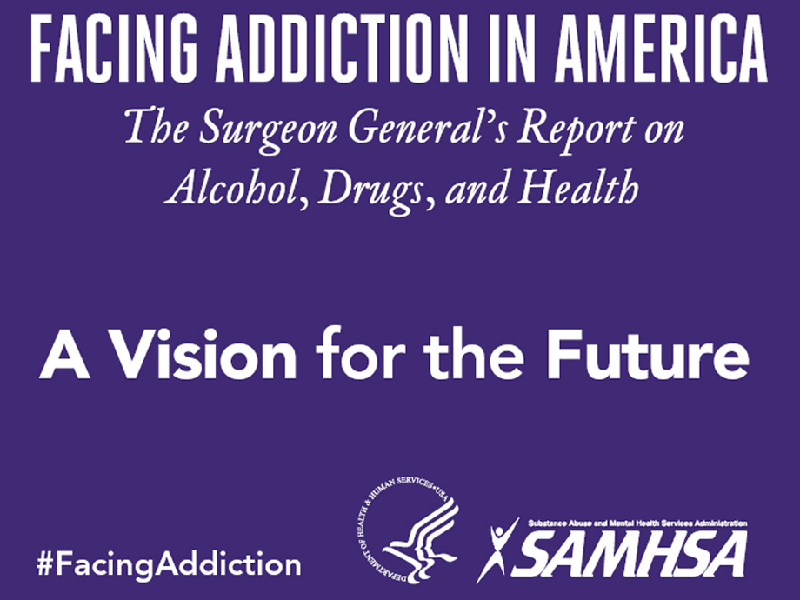Surgeon General Releases Updated Opioids Report
October 02, 2018, 02:28 pm News Staff – Overdose deaths in 2017 increased by almost 10 percent compared with 2016, killing more than 70,000 Americans, according to preliminary data from the CDC Nearly 48,000 of those cases were opioid overdose deaths, with the sharpest increase seen in deaths related to the synthetic opioid fentanyl.
This unfortunate rise is chronicled in the latest HHS report on the topic, Facing Addiction in America: The Surgeon General's Spotlight on Opioids, which U.S. Surgeon General Jerome Adams, M.D., M.P.H., released Sept. 20. This spotlight document compiles the opioid-related information from Facing Addiction in America: The Surgeon General's Report on Alcohol, Drugs and Health, which was published in 2016, into a single document and provides updated data on the prevalence of substance use, opioid misuse, opioid use disorders, opioid overdoses, and related harms.
The spotlight report, jointly developed by the surgeon general's office and the Substance Abuse and Mental Health Services Administration (SAMHSA), recaps the latest data on the prevalence of substance use, opioid misuse, opioid use disorders (OUDs) and opioid overdoses.

Together with supporting resources featured on the surgeon general's addiction website, the report calls for a cultural shift in the way Americans talk about the opioid epidemic and recommends actions that can prevent and treat opioid misuse and promote recovery.
According to the report, only about one out of four (28.6 percent) people with an OUD receive any type of treatment for it, even though effective treatment options exist. This gap could be due to a variety of reasons, including stigma, inability to access or afford care, or refusal to stop misusing opioids.
"Addiction is a brain disease that touches families across America -- even my own," Adams said in an HHS news release about the report. "We need to work together to put an end to stigma."
Additionally, the report noted that the health care workforce available to treat OUDs is understaffed, sometimes lacks adequate training and has been slow to implement medication-assisted treatment.
"Now is the time to work together and apply what we know to end the opioid crisis," said Elinore McCance-Katz, M.D., Ph.D., assistant secretary for mental health and substance use, in the release. "Medication-assisted treatment combined with psychosocial therapies and community-based recovery support is the gold standard for treating opioid addiction."
Story Highlights
Progress Made
The surgeon general's report highlighted work the federal government has done both independently and in collaboration with other stakeholder organizations, which it said has led to progress in the fight against opioid abuse.
HHS noted in its news release that it had just disbursed more than $1 billion in opioid-specific funding for states, including $930 million in State Opioid Response Grants administered by SAMHSA to support prevention, treatment and recovery services.
Additionally, the Health Resources and Services Administration (HRSA) provided funding to community health centers to increase access to substance abuse disorder and mental health services, as well as to increase the number of professionals and paraprofessionals who are trained to deliver integrated behavioral health and primary care services as part of health care teams in HRSA-supported health centers.
HRSA also has funded rural grantees to help them increase services and develop plans to implement evidence-based OUD prevention, treatment and recovery interventions.
"We are making progress," said Assistant Secretary for Health Brett Giroir, M.D, who also serves as the HHS Senior Advisor for Opioid Policy, in the release. "Just last week, we released the 2017 National Survey on Drug Use and Health data, which showed significantly more people received treatment for their substance use disorder in 2017 than in 2016. This was especially true for those with heroin-related opioid use disorders."
Call to Action
The surgeon general's report called on a wide range of stakeholders to combat the opioid crisis, offering suggestions for how they could do so.
The advice for health care professionals, including family physicians, included calls to
- address substance use-related health issues with the same sensitivity and care as other chronic health conditions;
- follow the CDC Guideline for Prescribing Opioids for Chronic Pain;
- assess for behavioral health risk factors to help inform treatment decisions when opioids are prescribed, while collaborating with mental health professionals;
- check prescription drug monitoring programs before prescribing opioids;
- refer patients to opioid treatment professionals when necessary; and
- become qualified to prescribe buprenorphine for the treatment of OUD.
Supplementary Materials
Among supplementary materials released alongside the report are a digital postcard that highlights tangible actions all Americans can take to raise awareness, prevent opioid misuse and reduce overdose deaths.
The surgeon general's website also features an advisory on naloxone and opioid overdose and links to additional federal opioid resources and other information and materials.
Related AAFP News Coverage
Number of Women With OUD in Labor/Delivery Quadruples
CDC Data Show Increases in All States Studied
(8/21/2018)
More From AAFP
American Family Physician: New Drug Reviews: Implantable Buprenorphine (Probuphine) for Maintenance Treatment of Opioid Use Disorder
(5/15/2018)